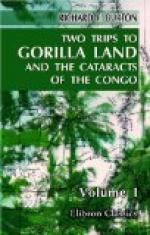The modifications with which we must read the picturesque pages of the “Gorilla Book” are chiefly the following. The Gorilla is a poor devil ape, not a “hellish dream-creature, half man, half beast.” He is not king of the African forest; he fears the Njego or leopard and, as lions will not live in these wet, wooded, and gameless lands, he can hardly have expelled King Leo. He does not choose the “darkest, gloomiest forests,” but prefers the thin woods, where he finds wild fruits for himself and family. His tremendous roar does not shake the jungle: it is a hollow apish cry, a loudish huhh! huhh! huhh! explosive like the puff of a steam-engine, which, in rage becomes a sharp and snappish bark — any hunter can imitate it. Doubtless, in some exceptional cases, when an aged mixture of Lablache and Dan Lambert delivers his voce di petto, the voice may be heard for some distance in the still African shades, but it will hardly compare with the howling monkeys of the Brazil, which make the forest hideous. The eye is not a “light grey” but the brown common to all the tribe. The Gorilla cannot stand straight upon his rear quarter when attacking or otherwise engaged without holding on to a trunk: he does not “run on his hind legs;” he is essentially a tree ape, as every stuffed specimen will prove. He never gives a tremendous blow with his immense open paw; doubtless, a native legend found in Battel and Bowdich; nor does he attack with the arms. However old and male he may be, he runs away with peculiar alacrity: though powerfully weaponed with tigerish teeth, with “bunches of muscular fibre,” and with the limbs of Goliah, the gorilla, on the seaboard at least, is essentially a coward; nor can we be surprised at his want of pluck, considering the troubles and circumstances under which he spends his harassed days. Finally, whilst a hen will defend her chicks, Mrs. Gorilla will fly, leaving son or daughter in the hunter’s hands.
Chapter XII.
Corisco—“Home” to Fernando Po.




